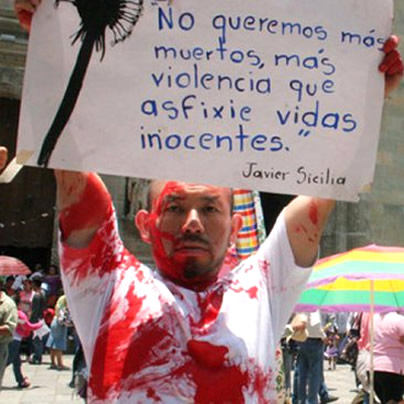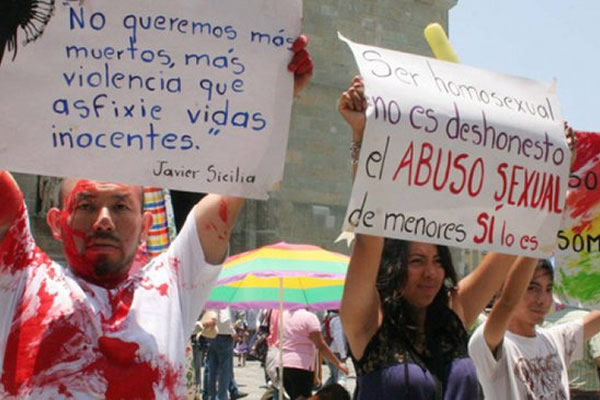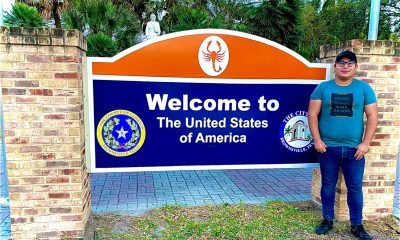World
Mexican Supreme Court rules against same-sex marriage ban
Three gay Oaxacan couples challenged denial of marriage licenses, ruling opens possibility of same-sex marriage throughout the country.


Lawyer Alex Ali Mendez Diaz represented three same-sex couples from the Mexican state of Oaxaca whom local authorities denied marriage licenses. (Photo courtesy of Alex Ali Mendez Diaz)
The Mexican Supreme Court on Wednesday unanimously struck down a law in the southern state of Oaxaca that defined marriage as between a man and a woman.
Three couples — Lizeth Citlalli Martínez Hernandez and María Monserrat Ordóñez Narváez, Jesús Reyes Álvarez and Guillermo Emmanuel Martínez Pimental and Karina Mendieta Pérez and Gabriela Castellanos Mota — tried to apply for marriage licenses in Oaxaca, but local authorities denied their applications.
Lawyer Alex Alí Méndez Díaz filed lawsuits on behalf of two of the couples in Aug. 2011 and a third in January who sought legal recourse, known as an “amparo” in the Mexican judicial system, that would ensure local authorities would protect their constitutional rights. Geraldina González de la Vega, a lawyer who advised Méndez, noted to the Washington Blade this “remedy can be used against laws or acts of authority” in Mexico.
A Oaxacan court in April ruled in favor of Martínez and Ordóñez, but against Reyes and Martínez and Mendieta and Castellanos. An appellate judge in August cited the Mexican constitution that bans anti-gay discrimination in his ruling that ordered Oaxacan authorities to allow same-sex marriages.
The state’s governor and Congress petitioned the Mexican Supreme Court to review the case — Méndez also asked the tribunal to determine the criteria under which the Oaxacan marriage law should be understood.
“The court did not declare the unconstitutionality of the law, but the effect of its application is that the justices said that one would have to understand marriage is a contract celebrated between two people without any reference to the sex of those who enter into it,” Méndez told the Washington Blade during an interview from Mexico City hours after the justices issued their decision.
Same-sex couples have been able to legally marry in the Mexican capital since 2010, and the Mexican Supreme Court has ruled other states must recognize same-sex marriages legally performed in Mexico City. Same-sex couples have also married in Quintana Roo, which includes the resort city of Cancún on the Yucután Peninsula.
The state of Coahuila offers property and inheritance rights and other limited legal protections to same-sex couples.
The latest Mexican Supreme Court decision only applies to Oaxaca, but advocates maintain these cases will open the doors to same-sex marriages across the country.
González noted the court needs to issue five rulings before the “amparo” will “have general effects” throughout the country.
“We already have three,” she said.
“These cases set a precedent that can be invoked in any other state in Mexico,” Méndez added. “While it is not obligatory for those who must resolve these new cases, there is a high possibility that the result will be the same as what we have obtained in Oaxaca.”
Enrique Torre Molina, an LGBT activist and blogger in Mexico City, agreed.
“It’s not going to be long before same-sex marriage is a reality in the whole country,” he told the Blade on Wednesday. “It’s a matter of same-sex couples who have been thinking about getting married and haven’t done it either because they’re not in Mexico City and traveling is not an option or because they were going to get no for an answer. It’s just a matter of time of trying it out as these couples in Oaxaca [did] and sort of contribute to this history.”
The Mexican Supreme Court issued its ruling hours after a Colombian Senate committee approved a measure that would legalize same-sex marriage. Senators in the South American country are expected to debate the bill on Tuesday.
Same-sex couples have been able to legally marry in Argentina since 2010. Neighboring Uruguay allow civil unions for gays and lesbians, but the country’s lawmakers are expected to debate a same-sex marriage measure on Tuesday.
The Inter-American Court of Human Rights in February ruled in favor of lesbian Chilean Judge Karen Atala who lost custody of her three daughters to her ex-husband in 2005 because of her sexual orientation. Three gay Chilean couples who had been denied marriage licenses filed a lawsuit with the tribunal in September after the country’s Supreme Court ruled against them.
The Mexican Supreme Court cited the Atala case in its decision.
“Our country has already been sanctioned on many occasions by the IACHR,” Méndez said. “Our country, being part of this Inter-American system, will have to follow this trend in regard to protecting the human rights of the LGBT community.”
J. Lester Feder, a former Politico reporter who has covered the same-sex marriage throughout Latin America for four months for his blog AfterMarriage.org, noted to the Blade from Oaxaca that courts throughout the region often look to those in other countries in reaching their own decisions. He said the Atala case is one of the legal precedents the Oaxacan couples used in their successful lawsuits.
Justice José Ramón Cossío told CNN en Español he expects the same-sex marriage could become a reality throughout the country within a few months.
“The three cases are effective with respect to the state of Oaxaca,” he said. “By the position that we have on the Supreme Court as the country’s highest tribunal, it is foreseeable that if other people from other federal entities challenged a code that had a similar condition, the court would reiterate its criteria and within the next few months will guarantee the juris prudence that will become mandatory.”
Feder agreed.
“It means that it’s very likely universal marriage rights are going to be available in Mexico well before the United States,” he said. “International human rights law in the Americas is [increasingly interpreting] marriage rights as human rights, but the United States legal system doesn’t internalize international norms. We’re not participating in that trend.”
Africa
For queer Nigerians, being on gay dating apps is still a risk
Homophobes target users for violence

Gay hookup apps like Grindr, and dating apps like Tinder and Bumble have managed to proliferate queer communities in countries like Nigeria.
Those who seek one night stands find what they want while those looking for love equally find what they seek. These platforms have managed to position themselves as safe spaces for queer people in anti-gay Nigeria. In recent times, however, it is proving to be unsafe, as homophobic people are quickly learning about the apps, and opening accounts that either seek to outrightly threaten queer people, or pretend to be queer, have long chats with gay people, invite them over, and inflict violence on them.
Take the case of Biodun, a queer Nigerian man who joined Grindr to meet up with guys like him.
After Biodun had built a connection and agreed to meet with someone whose display name was “Mamba,” they decided to meet up only for him to be met with violence. Apparently, Mamba ran a catfish account.
“I’ll never forget that day,” Biodun, who asked the Washington Blade not to use his last name because of safety concerns, said. “I still think about it, and sometimes blame myself for being very careless, even though Grindr was supposed to be our safe space.”
Biodun’s experience isn’t peculiar to him.
In Nigeria, draconian laws that criminalize same-sex relationships exist, making queer people turn to the digital realm to explore their identities and seek connections beyond the confines of societal oppression that comes with the physical environment. Gay dating apps such as Grindr, therefore, have emerged as virtual sanctuaries, offering spaces for queer Nigerians to forge friendships, find solidarity, and pursue romantic or sexual relationships. Spaces like this, however, have morphed into a landscape fraught with danger, as homophobic people have weaponized these platforms to perpetuate hate and violence.
“Sometimes, I often wonder how they learned about these platforms,” Daniel, which is not his real name, told the Blade. “You would think that it is just us in the platforms, until you find out that the accounts are rooted in homophobia.”
One time, someone’s bio read, “I’m only here to deal with the gay people. I know all of you, and I will find and kill you. We no want una for here (translates to we do not want you here, in English.)” It was a stark reminder that these spaces are no longer LGBTQ-friendly for Nigerians. In 2014, there was the passage of the Same-Sex Marriage Prohibition Act by former President Goodluck Jonathan, which not only criminalized same-sex unions, but also imposed severe penalties on anyone involved in LGBTQ advocacy or support.
This law catalyzed a surge in discrimination and violence against queer Nigerians; emboldening regular civilians, religious extremists, and even law enforcement agencies to target individuals perceived as deviating from traditional gender and sexual norms. Again, amid this hostile environment, gay dating apps emerged as lifelines for many queer Nigerians, offering avenues for discreet communication, community building, and the pursuit of intimate relationships.
The very anonymity and freedom these apps provided, however, became double-edged swords.
The advent of screenshot and screen-recording capabilities on these apps, for example, reduced the risks of exposure, strengthening the safety and privacy of users. However, this also comes with its own lapses, as queer people using Grindr have often relied on screenshots and screen recordings to confirm the identities of potentials with their friends, before accepting to meet.
“Before the removal of the screenshot option, I usually shared photos of others with my trusted friends,” Biodun shared. “But since that was taken off, there was no way for me to do that.”
Although, according to Grindr’s terms and conditions, the removal came with privacy concerns, as it was to facilitate a safe dating experience.
This erosion of digital safe spaces is depriving queer Nigerians of vital avenues for self-expression and affirmation,and is exacerbating the psychological toll of living in a society that continues to systematically demonize their identities. Moreover, the normalization of homophobic rhetoric and violence in both physical and digital realms has perpetuated a cycle of fear and oppression, and is reinforcing this notion that LGBTQ individuals are inherently unworthy of dignity and respect. Despite these challenges, though, the resilience of queer Nigerians continue to persist, as they defy societal norms and assert their right to love and be loved.

Dominica’s High Court of Justice on Monday struck down provisions of a law that criminalized consensual same-sex sexual relations.
A gay man who remains anonymous in 2019 challenged sections of the country’s Sexual Offenses Act that criminalized anal sex and “gross indecency” with up to 10 years and 12 years in prison respectively. The plaintiff argued the provisions violated his constitutional rights.
The Dominica Equality and Sexual Expression Association and the Eastern Caribbean Alliance for Diversity and Equality, a group that advocates for LGBTQ and intersex rights in the region, in a press release noted the court in its ruling affirmed “the criminalization of consensual same-sex activity between adults is unconstitutional.” The groups added Justice Kimberly Cenac-Phulgence “declared that the laws commonly known as buggery and gross indecency laws, contravenes the constitution of the Commonwealth of Dominica, namely the right to liberty, freedom of expression, and protection of personal privacy.”
“It is long past time that the dignity and dreams of all Dominicans were recognized,” said DESEA Executive Director Sylvester Jno Baptiste in the press release. “We are all God’s children, and he loves us all equally. Laws that treat some Dominicans as less than others, have no place in a just society.”
Dominica is a former British colony that is located between Guadeloupe and Martinique in the Lesser Antilles.
Antigua and Barbuda, St. Kitts and Nevis, Barbados, and Trinidad and Tobago in recent years have decriminalized consensual same-sex sexual relations.
The Inter-American Commission on Human Rights in 2021 issued a decision that said Jamaica must repeal its colonial-era sodomy law. The country’s Supreme Court last year ruled against a gay man who challenged it.
A judge on St. Vincent and the Grenadines’s top court in February dismissed two cases that challenged the country’s sodomy laws.
“Decriminalization helps create an environment where LGBTQ individuals can live openly without fear of persecution, enabling them to access health care, education, and employment without facing discrimination,” said Outright Executive Director Maria Sjödin on Monday in response to the Dominica ruling. “The repeal of these discriminatory laws is a testament to the tireless efforts of activists, advocates, and allies who have long fought for justice and equality. It is a victory for human rights and a significant milestone in the ongoing struggle for LGBTQ rights in the Caribbean.”
Africa
Upcoming Ugandan Census will not count intersex people
Advocacy group report documents rampant discrimination, marginalization

Uganda’s national Census next month will not count intersex people.
The revelation about the exclusion of intersex Ugandans in the 9-day Census exercise that will begin on May 10 has been confirmed to the Washington Blade by the head of Uganda’s Bureau of Statistics.
UBOS Executive Director Chris Mukiza in response to the Blade’s questions on the issue said the agency has “no business with intersex.”
Their counting could have made Uganda the second African country and the third globally after Australia and Kenya to collect an intersex person’s data in a Census.
Kenya’s 2019 Census determined there were more than 1,500 intersex people in the country.
Uganda had a population of 34.8 million, according to the country’s last Census that took place in 2014.
Intersex people in Uganda are among marginalized groups, subject to stigma and discrimination. The government has yet to recognize them as the third sex and consider them among other minority groups, such as people with disabilities, who enjoy special treatment.
Intersex people cannot be exclusively categorized as male or female for having a biological congenital condition with unique sex characteristics due to inherent and mixed anatomical, hormonal, gonadal, or chromosomal patterns that could be apparent before, at birth, in childhood, puberty, or adulthood.
Mukiza’s position of excluding intersex people in the Census, however, comes amid the prime minister’s office’s demands for inclusivity and equality for all the population. (The Constitutional Court on April 3 refused to “nullify the Anti-Homosexuality Act in its totality.”)
“We recognize that much work remains to be done particularly in addressing the needs of the marginalized and vulnerable communities, promoting inclusive economic growth, and combating climate change,” said Dunstan Balaba, the permanent secretary in the prime minister’s office.
Balaba spoke on April 18 during the National Population and Housing Census prayer breakfast meeting the UBOS convened. Religious leaders and other stakeholders attended it.
President Yoweri Museveni has noted that data from the country’s sixth national Census will be crucial towards achieving the nation’s Vision 2040 and help the government, non-governmental organizations, and donors in providing services to the diverse population.
“It will also provide the basis for planning the provision of social services such as education, health, and transport, among others at the national and local level,” Museveni said as he urged citizens to fully support the Census and provide accurate information.
Uganda has an intersex rights organization, “Support Initiative for People with Atypical Sex Development (SIPD),” which activist Julius Kaggwa founded in 2008 with the support of groups that advocate for children, women, and other marginalized populations.
Some of SIPD’s work as a non-profit, grassroots organization includes community outreach and engagement, sharing reliable information with the society for the protection of intersex people’s rights, and championing the need for organized medical and psychological support.
The organization, through its numerous reports, has decried human rights violations against intersex people that include surgery without consent, discrimination in homes, schools and medical centers, parents abandoning intersex children, and stigma due to lack of legal protection by the government.
Uganda’s Registration of Births and Deaths Act allows a parent or guardian of a child under the age of 21 to change the name or sex at the local registration office. The SIPD, however, maintains this law is discriminatory to intersex people over 21 who want to change their sex characteristics, and want parliament to repeal it.
The intersex rights organization wants the Health Ministry to establish a central registry to register intersex children after they’re born in order to receive support in terms of healthcare, social and legal by the government and other stakeholders as they grow up.
SIPD particularly wants the government to enact a policy that would allow a gender-neutral marker on birth certificates for intersex children to ease any change of sex in the future. The organization also wants the government, through the Education Ministry, to adopt a curriculum that also considers intersex issues in schools and creates a friendly environment for intersex children to learn and graduate like their non-intersex peers.
These demands follow SIPD’s findings that disclosed many intersex children were dropping out of school because of the stigma and discrimination they suffered. The organization has further called on the public-funded Uganda Human Rights Commission to live up to its constitutional mandates of defending human rights by leading the promotion and protection of the rights of intersex people across the country.
SIPD has also challenged religious leaders, who play a key role in Ugandan society and are influential at the local and national level, to promote acceptance of intersex people and to end discrimination against them.


















